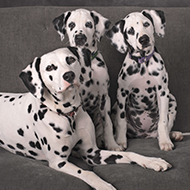Concerns upon release of new Dalmation film

Fears have been raised over the release of Disney's Cruella.
Potential owners are being urged not to rush into making impulsive puppy purchases following the release of a new Disney Dalmation film.
The Kennel Club and breed experts fear that Cruella could spark an interest in the breed and that people may go out and buy a puppy without considering how it will fit into their lifestyle.
The warning follows figures published by the organisation that show Dalmation popularity soared after the release of 101 Dalmations in 1996. That year, Dalmation ownership stood at an all-time high, with around 4,000 registrations.
The spotty dogs remained in the top 20 most popular breeds in the UK until 2004 when numbers then began to fall.
Likewise, figures show the original 1961 film almost doubled Dalmatian popularity, with puppy registrations rising from 791 to 1,549 between 1959 and 1963, and peaking as the 16th most popular breed in 1968.
Kennel Club spokesperson Bill Lambert said: “We often see trends for certain dog breeds fluctuate as a result of what people see in films or on television and the Dalmatian, an elegant breed that can turn heads in its own right, is certainly no exception.
“Whilst they can make wonderful pets when raised in the right environment, they can be too much of a handful for some, especially when there are 101 of them! Although Pongo and Perdita lived in a townhouse in London, in reality, these breeds are much more suited to a larger living space with access to a garden.”
Margaret Cuthbertson, secretary and vice-president for the North of England Dalmatian Club, added: “Dalmatians are loving and loyal companions but, despite their enduring popularity, are not suitable for everyone.
“We are concerned that seeing these distinctive dogs on the big screen again will prompt many people to rush into buying one, without considering whether they actually have the means necessary to own one long-term.”



 The Veterinary Medicines Directorate (VMD) is inviting applications from veterinary students to attend a one-week extramural studies (EMS) placement in July 2026.
The Veterinary Medicines Directorate (VMD) is inviting applications from veterinary students to attend a one-week extramural studies (EMS) placement in July 2026.